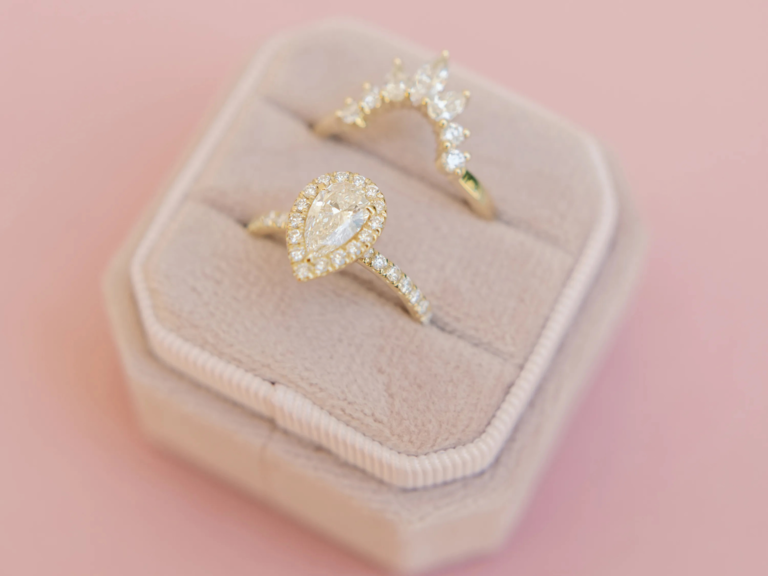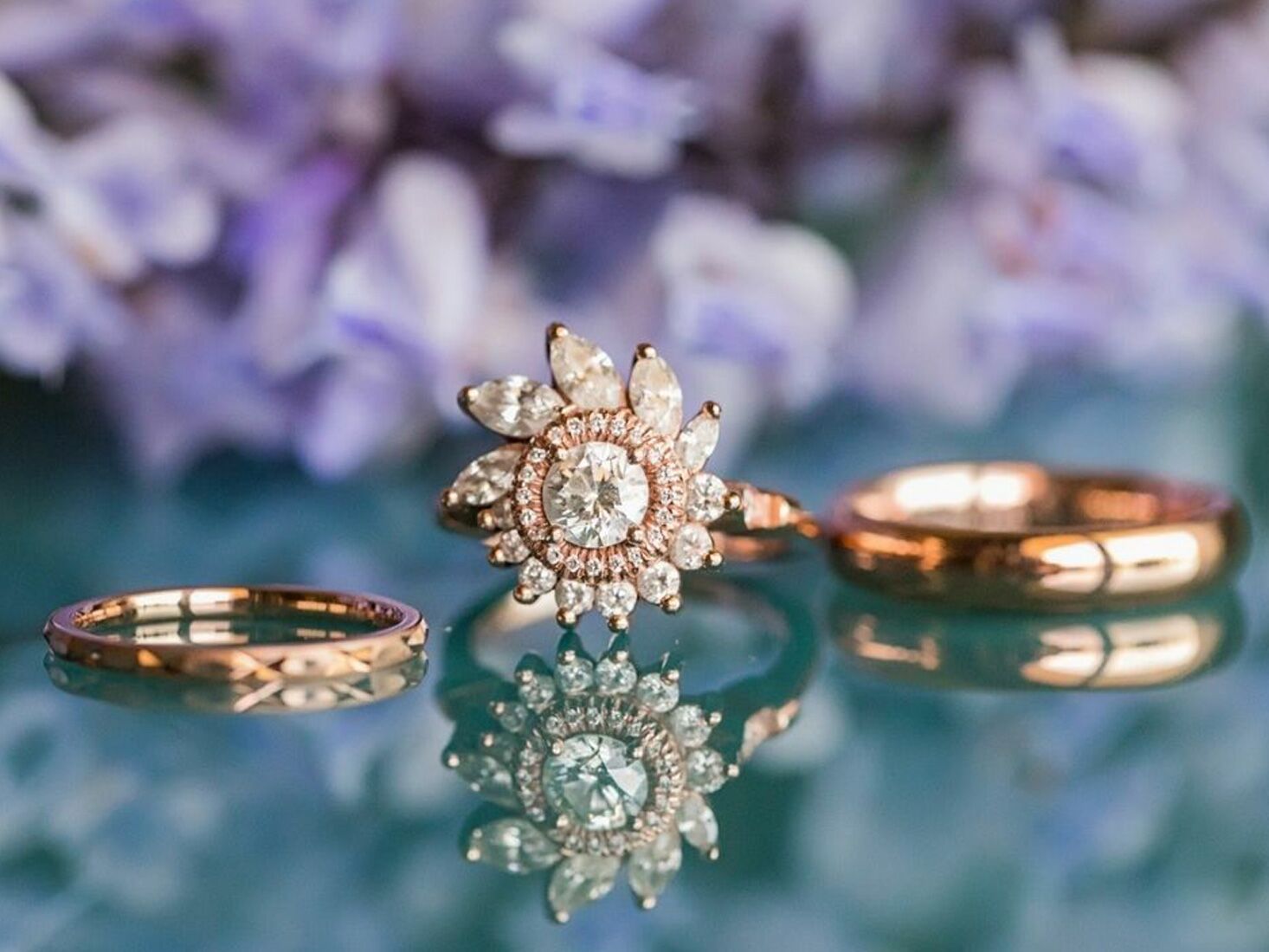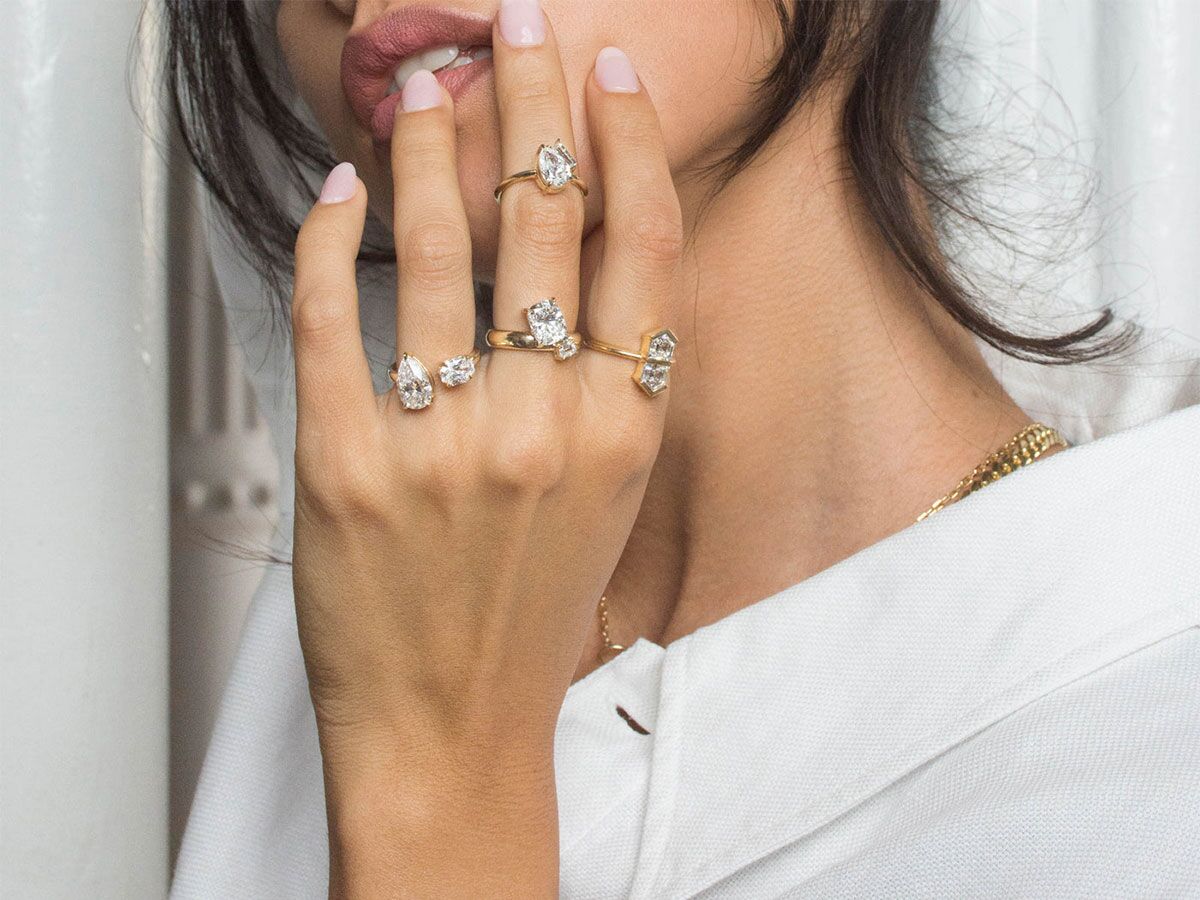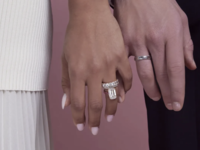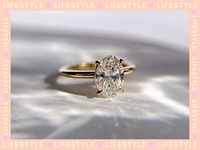Should You Solder Rings Together? Experts Weigh In
Once the big wedding day is over, newlyweds traditionally start wearing their engagement ring and wedding ring in a neat stack on their finger. It's at this point that some might wonder if it's a good idea to solder rings together. This means paying a jeweler to attach your rings so they become more like one ring than two separate pieces. While this sounds like a great idea in theory—you only need to stress over potentially losing one item, not two—it has its downsides as well, and it's important to keep everything in mind before deciding whether to solder or not. We spoke to expert jewelers to get their opinions on whether you should solder your rings. To find a jeweler to solder rings together near you, use The Knot Vendor Marketplace and search based on location and client reviews.
In this article:
- What Does it Mean to Solder Rings Together?
- Pros of Soldering Your Rings
- Cons of Soldering Your Rings
- How Long Does it Take to Solder Rings Together?
- How Much Does it Cost to Solder Rings Together?
- When Should You Solder Your Rings Together?
- Should You Solder Your Rings Together?
What Does it Mean to Solder Rings Together?
When you solder your engagement ring and wedding band together, you are essentially turning two rings into one. "Soldering is the process of joining two or more rings by using heat and a small amount of metal to fuse them at specific points," explains Justine Elliot, sales director at MiaDonna with more than 20 years of experience working with both made-to-order and custom wedding rings. "This process creates a single, unified piece of jewelry."
Some people assume that soldering rings together means that you're almost melting them together, but this isn't the case. "It's not taking the metal from the existing rings and melting them together," says Marci Bailey, founder and CEO of Marcilla Bailey, a Los Angeles-based jewelry brand. "It's literally a process of adding a small amount of metal to adhere the two of them together." The type of metal added is determined by the metal on the existing rings. It's also important to note that soldering rings together is not a permanent change—the process can be undone if needed.
Pros of Soldering Your Rings
Soldering your wedding rings together can sound like a big commitment (because it kind of is), but it has its advantages.
It Can Prevent Misalignment
Depending on the design of your wedding band and engagement ring, you might find that, as two separate pieces, they're not always perfectly aligned. However, soldering them together ensures that they always will be. As Elliot notes, soldering them together can help prevent twisting or spinning around the finger, which they can do independently when they are worn separately.
It May Feel More Comfortable
"A single, unified ring feels smoother on the finger and avoids the discomfort of rings rubbing against each other," Elliot says. Two rings soldered together may also mean it's easier and more comfortable to put them on and take them off each day.
It Can Reduce Some Wear and Tear
According to Bailey, the biggest advantage of soldering rings together is that it can make them look better. "It minimizes the amount of wear and tear on those rings that occur when they're next to each other and are constantly moving and rubbing against each other," she says. Since soldering means they're no longer moving independently, it can help prevent scratches that might occur from each other or other damage that might happen from the rubbing.
It Offers a More Streamlined Look
Both Bailey and Elliot note that when an engagement ring and wedding band are soldered together, it creates a more aesthetically appealing look. "Soldering can create a cleaner and more polished look, especially for rings designed to complement each other," Elliot says.
It Can Feel More Practical for Daily Wear
A soldered set of rings can feel easier to manage for everyday tasks and activities compared to two separate, important rings. You don't have to worry about them shifting or separating when doing things that involve your hands.
Cons of Soldering Your Rings
Before you pull the trigger on soldering your rings together, it's essential to consider the disadvantages.
There Is Less Flexibility
Both Elliot and Bailey agree that the biggest disadvantage of soldering rings together is the loss of flexibility in wearing them independently. "For example, if you happen to be going on vacation and you don't want to take your engagement ring, but you'd love to be able to wear something on your finger, such as just your band, it removes that option," she says. This also means you can't switch up how you wear your rings or upgrade your band or engagement ring one day.
You're Creating a Bulkier Ring
When you connect two rings together, even ones that are delicate on their own, you're automatically creating a larger, bulkier ring. "Soldering two rings together will make the bandwidth thicker," Elliot says. She notes that resizing to a larger size is often needed for the new soldered ring to fit comfortably.
Future Resizing Can Be Difficult
If your finger size ever changes and your ring starts feeling too small, resizing a soldered ring can be more difficult, according to Elliot. She explains that the process of resizing a soldered ring is more challenging and expensive because a jeweler will often have to separate them first.
There's a Chance the Alignment May Be Off
While soldering your rings together often means that they're better aligned, the opposite can happen. If the wedding band is a different thickness to the band of the engagement ring, they may not align perfectly, Elliot explains. If you have an inexperienced jeweler solder your rings, this is a definite possibility.
Undoing the Process Can Be Tricky
While it's possible to separate soldered rings, it's not always easy. Separating them typically means melting the soldered joint, which can potentially lead to damage to both the engagement ring and the wedding band. That damage may be fixable but it also may not be, so that's a risk you'll take. Some jewelers may even refuse to separate the pieces, so it might be hard to find someone who can do it well.
How Long Does it Take to Solder Rings Together?
The good news is that it usually doesn't take too long to solder rings together. The length of time really depends on the jeweler. For example, Bailey says that she can solder rings from her store together in just a few hours, while Elliot says that it usually takes about three to four business days depending on the jeweler and their current workload.
"Soldering generally takes a little longer than a general repair due to aligning the rings perfectly," Elliot explains. This is especially true if the rings require special care or additional adjustments, like resizing.
How Much Does it Cost to Solder Rings Together?
The cost of soldering rings together can vary depending on a few different factors, such as the jeweler doing it, the precious metals being used and the complexity of the rings. "On average, it costs over $100 for a 14k solder and over $150 for a platinum solder," Elliot says. "If the rings have intricate designs, different metals or gemstones that require extra care, the price may be slightly higher."
When Should You Solder Your Rings Together?
If you want to solder your rings together, you can do it anytime just because you want to. However, Bailey says that she recommends that newlyweds wait a few weeks after the wedding before heading to a jeweler. "I always recommend wearing them together to get a sense of how you're going to wear them on a day-to-day basis," she says.
That said, Elliot notes that if you're experiencing the below, you may want to consider soldering them together sooner rather than later:
- Your rings frequently shift out of alignment and look "off."
- Your rings, or one of the rings, have some sort of design and you're worried they'll scratch each other. If you want to protect against wear and tear caused by friction, soldering is the way to go.
- You know that you'll never want to wear the rings separately and find that dealing with two pieces is annoying.
- You have a contoured wedding band and want the curve to sit perfectly around the center stone at all times.
- Your bands are two different metals. For example, Bailey notes that if the engagement ring is white gold and the wedding band is platinum, the different metals will rub together and can create deterioration in one ring over time. Soldering them together removes the friction between the different metals.
Should You Solder Your Rings Together?
At the end of the day, the decision to solder your rings together or leave them as two separate pieces is yours to make and can depend on the circumstances. "I recommend soldering if you prioritize comfort, security and preserving the longevity of your rings," Elliot says. "It's especially beneficial for intricate designs that are meant to fit together seamlessly."
However, Bailey points out that she doesn't recommend it if you don't like the idea of losing flexibility. "I personally have never soldered my rings together because I was always somebody who wanted the flexibility of wearing them separately," she says. "But if you're somebody that, day in and day out, year after year, you always wear them together, then yes, I think soldering them together is a great idea."
Before you decide to go for it, be sure to talk with a jeweler you trust to get their advice about your specific rings. They can inform you on whether or not they think it's the right fit.
